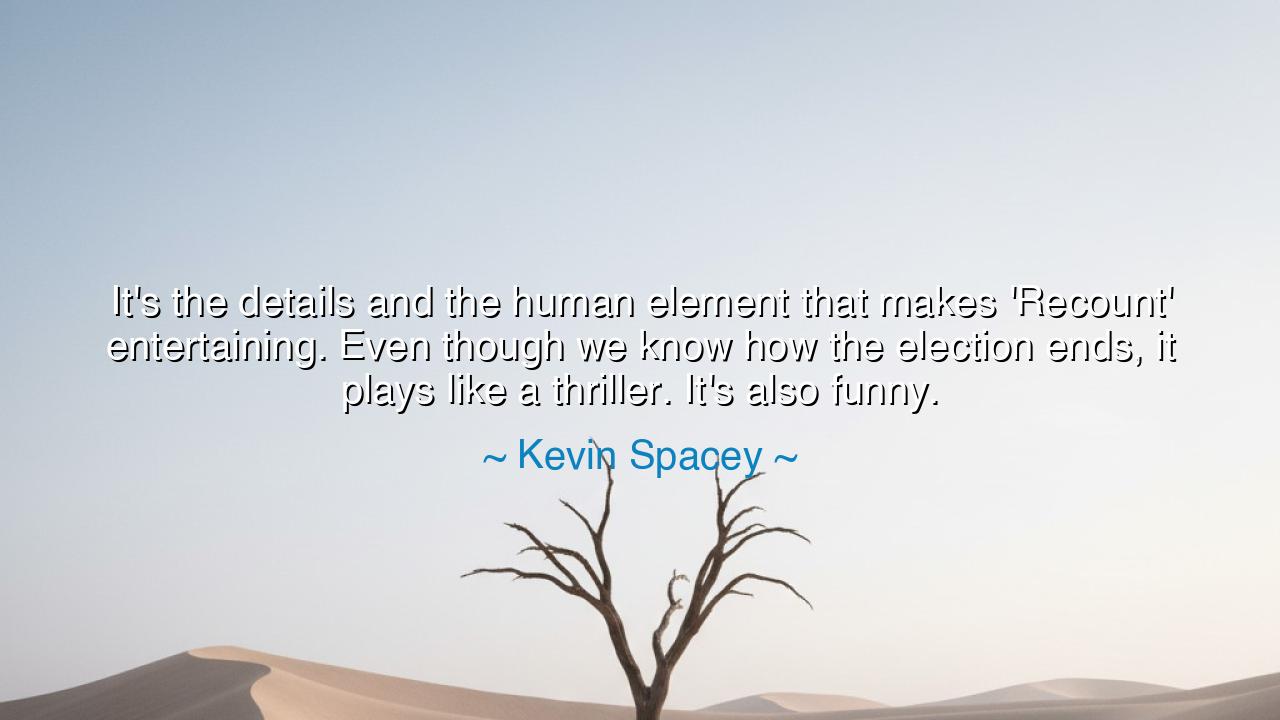
It's the details and the human element that makes 'Recount'
It's the details and the human element that makes 'Recount' entertaining. Even though we know how the election ends, it plays like a thriller. It's also funny.





“It’s the details and the human element that makes ‘Recount’ entertaining. Even though we know how the election ends, it plays like a thriller. It’s also funny.” — thus spoke Kevin Spacey, reflecting upon the power of storytelling not merely as a chronicle of events, but as a mirror of the human spirit. In this single observation, he reveals a truth known to poets, philosophers, and dramatists across the ages: that the heart of any tale — political or personal, tragic or comic — lies not in its outcome, but in its details, its people, and the pulse of humanity that drives it forward.
The quote refers to “Recount,” the 2008 film dramatizing the U.S. presidential election of the year 2000, one of the most contentious and dissected moments in modern political history. The story of recounts, ballots, and legal battles could easily have been cold and procedural — a record of facts already known. Yet, as Spacey explains, it is not the outcome that captivates, but the journey, the small gestures, and the flawed, passionate men and women who fight for their beliefs. These are the details — the trembling hand counting votes, the whispered doubts in closed rooms, the glint of irony in defeat — that make history not just real, but alive.
When Spacey says the film “plays like a thriller,” he points to a deeper paradox: that life, though predictable in its end, is filled with tension in its unfolding. We all know how our stories will end — with the turning of time, with the inevitable close of all mortal things — yet still we live them as though each moment matters beyond measure. The thrill of existence comes not from ignorance of the end, but from the intensity of what we experience along the way. So too does Recount transform a known outcome into something riveting, because the human element — ambition, loyalty, error, and hope — brings eternal freshness to every retelling.
The ancients knew this well. Consider Homer’s Iliad, a tale recited across centuries. Every listener knew how it would end: Achilles would triumph, Troy would burn, heroes would fall. Yet still they wept and trembled, not because the story was new, but because it was human. The poet lingered on the small things — the clasp of hands between warriors, the tears of Priam as he begged for his son’s body, the rage and tenderness of Achilles — the details that make even fate seem alive. So too, in Recount, we see that the grandeur of history is made not by the victors’ names carved in stone, but by the flickering moments that reveal who we are beneath the masks of power.
When Spacey calls the film “funny,” he does not speak of mockery, but of irony — the humor that emerges when human beings stumble through greatness. For even in the gravest matters, there is absurdity; even in chaos, there is laughter. This is not to trivialize the weight of history, but to acknowledge its truth: that the human story is both tragedy and comedy intertwined. To laugh at the folly of politics, as Recount allows us to, is to see clearly the fragile balance of pride and humility that governs all human affairs. The laughter does not diminish the pain; it redeems it.
The meaning of Spacey’s reflection extends far beyond one film or one election. It is a meditation on how we must approach all of life — not as a grand march toward known conclusions, but as a tapestry of details that reveal our shared humanity. To see life this way is to find richness in what others overlook: the fleeting gesture, the quiet word, the imperfection that tells the greater truth. It is to recognize that meaning lies not in outcomes, but in the moments between them.
Let this, then, be the lesson: never pass too quickly through the details of your days, nor through the faces and stories of those around you. For within them lies the heartbeat of the world. Whether in history, art, or your own life, seek the human element — that pulse of emotion and imperfection that makes every story worthy of being told. If you find yourself in struggle, do not despair of its ending; find beauty in its unfolding. Learn to see the thrill even in the familiar, and the humor even in the heavy.
Thus spoke Kevin Spacey, not as a performer alone, but as one who has glimpsed the eternal truth of creation: that what moves us is not the inevitability of destiny, but the texture of being human — the laughter in the courtroom, the flaw in the hero, the small light of grace in the face of defeat. For it is in these details that every life, however brief, becomes its own immortal story.






AAdministratorAdministrator
Welcome, honored guests. Please leave a comment, we will respond soon